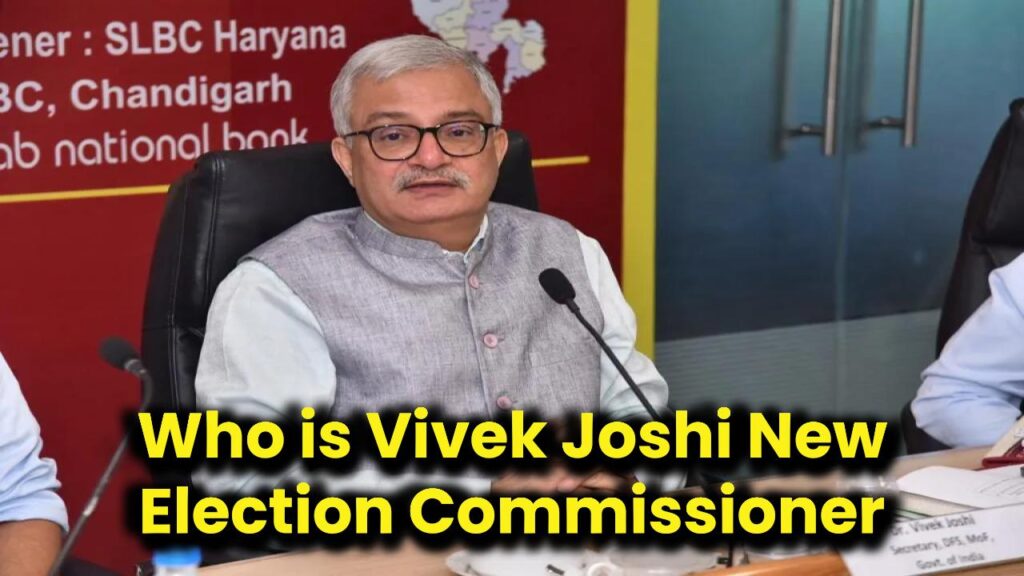
India has a new Election Commissioner, and it’s a name that commands experience and expertise—Vivek Joshi. His appointment has stirred discussions across political and administrative circles, raising important questions about what this means for the country’s democratic process.
Joshi, an IAS officer from the 1989 Haryana cadre, has held crucial government positions and brings decades of governance experience to the Election Commission of India (ECI). But why is this significant, and what does it mean for future elections? Let’s break it down.
Vivek Joshi Appointed as New Election Commissioner
| Topic | Details |
|---|---|
| Who is Vivek Joshi? | A senior IAS officer from the Haryana cadre, now appointed as India’s Election Commissioner. |
| Previous Roles | Chief Secretary of Haryana, Registrar General & Census Commissioner of India. |
| Significance of Appointment | Brings experience in governance, policy-making, and electoral management. |
| Impact on Elections | Will play a crucial role in conducting free and fair elections. |
| Selection Process | Appointed by a panel including PM Modi, Home Minister Amit Shah, and Opposition Leader Rahul Gandhi. |
| Official Source | Election Commission of India |
The appointment of Vivek Joshi as the new Election Commissioner marks a crucial step in India’s electoral landscape. With decades of administrative experience, he is well-positioned to strengthen election integrity, ensure transparency, and tackle modern electoral challenges. His tenure will be closely watched, especially with upcoming state and general elections.
For more updates on India’s elections, visit the Election Commission of India’s official website.
Who is Vivek Joshi? – A Look at His Career and Achievements
Early Career and Bureaucratic Journey
Vivek Joshi is a 1989-batch IAS officer from Haryana, known for his administrative expertise and strategic policy implementation. Over the years, he has held several key positions in both state and central governments, making significant contributions to governance and public administration.
Notable Positions Held
- Chief Secretary of Haryana (2024) – Supervised key governance initiatives in the state.
- Registrar General & Census Commissioner of India – Led India’s Census operations, ensuring data accuracy and policy alignment.
- Additional Secretary, Ministry of Finance – Handled economic affairs, taxation, and budget planning.
- Principal Secretary, Haryana Government – Oversaw rural development, finance, and governance reforms.
These roles have shaped Joshi’s deep understanding of policy implementation, particularly in areas directly impacting elections—such as census data analysis, voter registration, and administrative coordination.
Why His Appointment Matters?
The Election Commission of India (ECI) is the backbone of India’s democracy, responsible for ensuring free, fair, and transparent elections. The appointment of an Election Commissioner is always a significant event, particularly at a time when electoral integrity and institutional independence are key concerns.
1. Strengthening Electoral Processes
With a background in data management and governance, Joshi’s expertise will be instrumental in:
- Managing voter rolls efficiently using accurate census data.
- Ensuring smooth election processes, from electronic voting machine (EVM) management to poll security.
- Addressing electoral fraud and enhancing transparency in political funding.
2. Delimitation and Census Insights
As a former Registrar General and Census Commissioner, Joshi has a deep understanding of demographic trends. This is particularly crucial for future delimitation exercises, which will determine constituency boundaries based on updated population data.
3. Tackling Election Challenges
India faces several electoral challenges, including:
- Misinformation and fake news impacting voter behavior.
- Political funding transparency, with rising concerns over anonymous electoral bonds.
- Technology-driven challenges like cybersecurity risks in EVMs and voter databases.
With years of governance experience, Joshi is well-equipped to navigate these issues effectively.
The Selection Process: How Election Commissioners are Appointed
The appointment of Election Commissioners follows a structured selection process. Joshi was selected by a high-level committee that included:
- Prime Minister Narendra Modi
- Home Minister Amit Shah
- Leader of Opposition Rahul Gandhi
While this process is standard, it has sparked debates over the need for more transparency. The opposition has raised concerns, advocating for a wider consultation process involving judicial oversight.
What This Means for India’s Upcoming Elections
India is preparing for several key elections in the next few years, including General Elections 2029 and state assembly elections in multiple regions. Joshi’s role will be critical in ensuring voter participation, security, and credibility of results.
Key Focus Areas for Joshi
- Improving voter registration processes, ensuring every eligible citizen is registered.
- Enhancing election security to prevent tampering, fraud, or cyber threats.
- Ensuring strict adherence to the Model Code of Conduct, particularly in high-stakes elections.
- Implementing tech-driven solutions, such as AI-based monitoring for misinformation and blockchain for secure voting.
FAQs
1. Who is the new Election Commissioner of India?
Vivek Joshi, a 1989-batch IAS officer from Haryana, has been appointed as the new Election Commissioner.
2. Why is his appointment significant?
Joshi has extensive experience in governance, census operations, and electoral management, making him a key figure in ensuring free and fair elections in India.
3. What role does the Election Commissioner play?
The Election Commissioner is responsible for overseeing elections, ensuring compliance with electoral laws, and upholding the integrity of the voting process.
4. How was Vivek Joshi selected?
He was appointed by a committee including the Prime Minister, Home Minister, and Leader of the Opposition.
5. What challenges will he face?
Key challenges include electoral transparency, voter security, tackling misinformation, and improving voter turnout.







